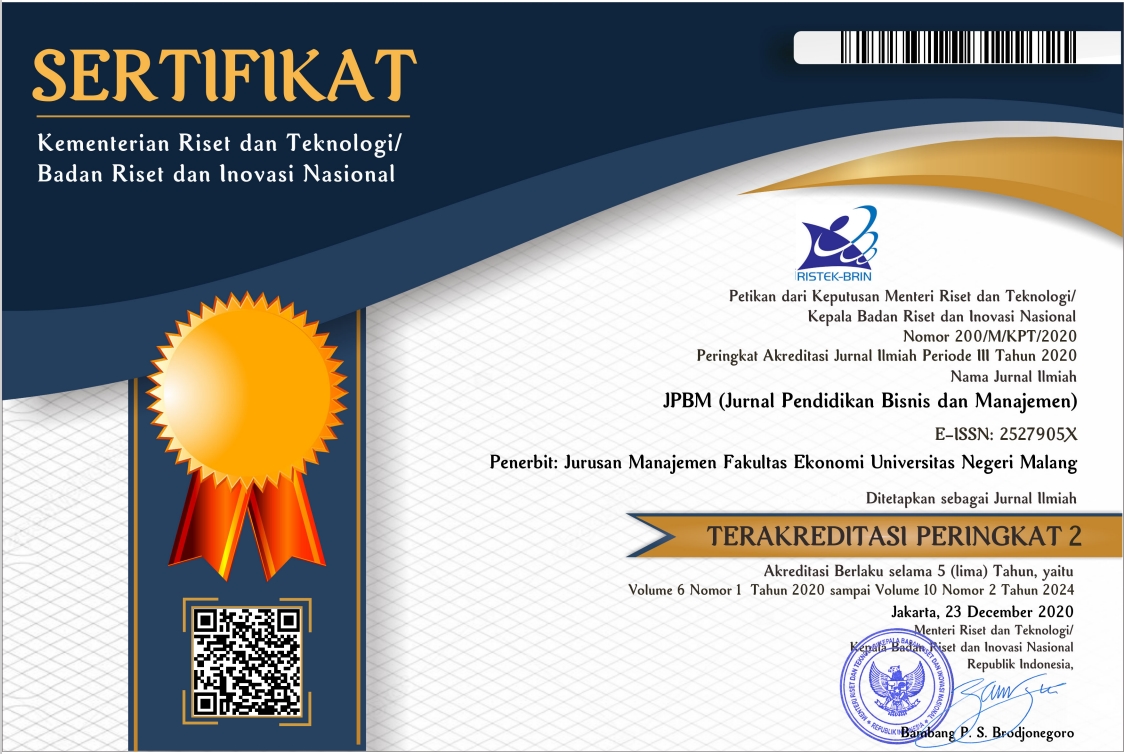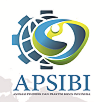The Role of Self Efficacy in Improving Student Metacognitive Skills
Abstract
This research aims to examine and explain the role of self-efficacy in improving student's metacognitive skills. The population of this study is the total number of students in class XI IPS in Bandung State High School 2017/2018 academic year. Instruments used (1) the scale of self-efficacy (2) the scale of metacognitive. This study uses an exploratory study type with a combination of surveys and literature reviews. The results showed that self-efficacy has an important role to show the confidence or confidence in the ability possessed by students in regulating the process of thinking and knowledge in using appropriate learning strategies related to metacognitive learning. Students who have a high level of self-efficacy will be followed by a high level of metacognitive skills.
Keywords
Full Text:
PDFReferences
Bandura, A. 1976. Sosial Learning Theory. Englewood Cliffs, New Jersey: A Paramount Communications Company.
Bandura, A. 1986. Social Foundation of Thought and Action : A Social Cognitive theory. New Jersey: Practice-H.
Bandura, A. 1997. Self-Efficacy (The Exercise of Control). New York: W. H. Freeman and Company.
Bandura, A. 2006. Guide for Constructing (self efficacy Scales. Dalam (self efficacy) beliefs of Adolescents. Chapter 14.
Chularut, P., & Debacker, T. K. 2004. The Influence of Concept Mapping on Achievement, Self-Regulation, and Self-Efficacy in Students of English as A Second Language. Contemporary Educational Psychology, 29, 248–263. https://doi.org/10.1016/j.cedpsych.2003.09.001.
Coutinho, S. A., & Neuman, G. 2008. A model of metacognition, achievement goal orientation, learning style and self-efficacy. Learning Environments Research, 11(2), 131–151. https://doi.org/10.1007/s10984-008-9042-7.
Daghistani, B. 2015. Level of Need for Cognition and Metacognitive Thinking Among Undergraduate Kindergarten Female Students At King Sa’ud University in Saudi Arabia. Education, 136, 101–111.
Flavell, J. 1979. Metacognition and cognitive monitoring: A new area of cognitive–developmental inquiry. American Psychologist, 34, 906–911.
Flavell, J. H., Shipstead, S. G., & Croft, K. 1980. What young children think you see when their eyes are closed. Cognition, 8, 369–387.
Ford, J. K., Smith, E. M., Weissbein, D. A., & Gully., S. M. 1998. Relationships of Goal Orientation, Metacognitive Activity, and Practice Strategies With Learning Outcomes and Transfer. Journal of Applied Psyc, 83(2), 218–233.
Joo, Y., Bong, M., & Choi, H. 2000. Self-efficacy for self-regulated learning, academic self-efficacy, and Internet self-efficacy in Web based instruction. Educational Technology, Research and Development, 48, 5-18.
Goh, C. 2016. Metacognitive Instruction for Second Language Listening Development : Theory, Practice and Research Implications. Regional Language Centre Journal, 39(2), 188–213. https://doi.org/10.1177/0033688208092184.
Gutiérrez, B. C. 2013. Future time orientation and learning conceptions: effects on metacognitive strategies, self-efficacy beliefs, study effort and academic achievement. Educational Psychology, 3410, 1–21. https://doi.org/10.1080/01443410.2013.858101.
Jane I. G., Deborah R. C., & Barbara L. M. 2002. Metacognition and it: The Influence of Self-Efficacy and Self-Awareness. Eighth Americas Conference on Information Systems. 1055-1064.
Johnson, R. D., Gueutal, H., & Falbe, C. M. 2009. Technology, trainees, metacognitive activity and e-learning effectiveness. Journal of Managerial Psychology, 24(6), 545–566. https://doi.org/10.1108/02683940910974125.
Kahraman, N. & Sungur, S. 2012. Antecedents and Consequences of Middle School Students’ Achievement Goals in Science. Asia-Pacific Education Researcher, 21(3), 535–551. https://doi.org/10.1007/s40299-012-0024-2.
Kiran, D. & Sungur, S. 2012. Sources and Consequences of Turkish Middle School Students’ Science Self-Efficacy. Asia-Pacific Education Researcher, 21(1), 172–180.
Kurbanoglu, S, S. 2003. Self-efficacy: A Concept Closely Linked to Information Literacy and Lifelong Learning. Journal of Documentation, 59(6), 635–646. https://doi.org/10.1108/00220410310506295.
Maddux. 2000. Self-Efficacy: He Power of Believing You Can. In S. C, R & J. Lopez, Shane (Eds.), Handbook of Positive Psychology (p. 709). New York: Oxford University Press.
Magno, C. 2009. Investigating the Effect of School Ability on Self-efficacy, Learning Approaches, and Metacognition. The Asia-Pacific Education Researcher, 18(2), 233–244.
Moores, T. T., Chang, J. C. & Smith, D. K. 2006. Clarifying the Role of Self-Efficacy and Metacognition as Indicators of Learning: Construct Development and Test. The DATA BASE for Advances in Information Systems, 37(2 & 3), 125-132.
Omrod, J. E. 2009. Psikologi Pendidikan Jilid 1. Jakarta: Erlangga.
Peng, Y., Hong, E., & Mason, E. 2014. Motivational and cognitive test-taking strategies and their influence on test performance in mathematics. Educational Research and Evaluation, 20(5), 366–385. https://doi.org/10.1080/13803611.2014.966115.
Pintrich. R. & Paul, S. M. G. 2003. Intentional Conceptual Change. Lawrence Erlbaum Associates, Inc., Publishers.
Renner, C. H. & Renner, M.J. 2001. But I Thought I Knew That: Using Confidence Estimation as a Debiasing Technique to Improve Classroom Performance. Applied Cognitive Psychology, 15, 23-32.
Schraw, G., & Moshman, D. 1995. Metacognitive Theories. In Educational Psychology Review (pp. 351–371). New York: JSTOR.
Schunk, H, D. 1985. Self-efficacy and Classroom Learning. Psychology in The School, 22, 208–223.
Şenol, Ş. 2016a. Modeling The Structural Relations Among Learning Strategies, Self-Efficacy Beliefs, and Effort Regulation. Problems Of Education in The 21st Century, 71, 62.
Şenol, Ş. 2016b. The relationship between secondary school students’ self-regulated learning skills and Chemistry Achievement. Journal of Baltic Science Education, 15(3), 312–324.
Shen, C., & Liu, H. 2011. Metacognitive Skills Development: A Web-Based Approach in Higher Education. The Turkish Online Journal of Educational Technology, 10(2), 140–151.
Stewart, G., Seifert, T. A., & Rolheiser, C. 2015. Anxiety and self-efficacy’s relationship with undergraduate students’ perceptions of the use of metacognitive writing strategies. The Canadian Journal for the Scholarship of Teaching and Learning, 6(1), 19. https://doi.org/http://dx.doi.org/10.5206/cjsotl-rcacea.2015.1.4.
Sungur, S. 2007. Modeling the relationships among students’ motivational beliefs, metacognitive strategy use, and effort regulation. Scandinavian Journal of Educational Research, 51(3), 315–326. https://doi.org/10.1080/00313830701356166.
Tok, Ş. 2013. Effects of The Know-Want-Learn Strategy on Students ’ Mathematics Achievement, Anxiety and Metacognitive Skills. Metacognition Learning, 8, 193–212.
Vancouver, J.B., Thompson, C., William, A.A. 2001. The Changing Signs in the Relationships Among Self-Efficacy, Personal Goals, and Performance. Journal of Applied Psychology. Vol. 86. No. 4: 605-620.
Van Opstal M.T., Daubenmire, P.L., 2015. Extending students’ practice of meta-cognitive regulation skills with the science writing heuristic. Int J Sci Educ 37, 1089–1112
Yerdelen-Damar, S., & Peşman, H. 2013. Relations of Gender and Socioeconomic Status to Physics Through Metacognition and Self-Efficacy. Journal of Educational Research, 106, 280–289. https://doi.org/10.1080/00220671.2012.692729.
Zimmerman, B. J. 2000. Self-Efficacy : An Essential Motive to Learn. Contemporary Educational Psychology, 25, 82–91.
DOI: http://dx.doi.org/10.17977/um003v4i32018p130
Refbacks
- There are currently no refbacks.
JPBM (Jurnal Pendidikan dan Bisnis Manajemen) is licensed under a Creative Commons Attribution-NonCommercial-ShareAlike 4.0 International License.
JPBM (Jurnal Pendidikan dan Bisnis Manajemen) is abstracted and indexed in :
















